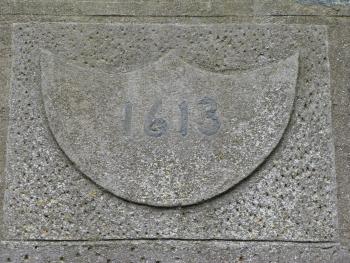Item Details

Work details
- Title
- Moulin Parish Church
- Work OCR text
SUMMARY DESCRIPTION
The present church, which is now used as a heritage centre, dates largely from reconstruction in 1829-31, and from subsequent repairs and remodelling in 1874-5; but it is possible that the medieval building was at least a partial conditioning factor on the successive later forms of the building.
HISTORICAL OUTLINE
The lands of Moulin appear to have been one of the demesne estates of the earls of Atholl and became the location in the later thirteenth or early fourteenth century of one of their main residences, the so-called Caisteal Dubh. The church there was in their patronage in the twelfth century. In the 1180s, probably between 1182 and 1187, Malcolm, earl of Atholl granted the church to the monks of Dunfermline. Possession of the church and its teinds was confirmed to the abbey by Bishop John I of Dunkeld, reinforced by two royal confirmations from King William between 1187 and 1195, and one from Pope Innocent III in 1207.(1) Despite this formidable array of parchment titles it seems that Dunfermline actually only possessed the patronage of the church until the 1230s. Between 1234, when he received authority in a papal bull, and 1236 Bishop Geoffrey confirmed Moulin in proprios usus to the abbey, with provision of a suitable vicar to serve the cure.(2) The church is listed in the first year of Bagimond’s Roll, but with no taxation figure entered for it.(3)
A dispute appears to have arisen over the church between the abbeys of Dunfermline and Scone in the late thirteenth and early fourteenth century. The cause of the contention appears to have been rights to specific teinds within the parish. In 1341, the dispute was settled by a convention between the two houses, with possession of parsonage and vicarage remaining with Dunfermline and a vicar pensionary serving the cure.(4) In 1520, the kirks and kirklands of Moulin and Kirkmichael were set in tack by the commendator of Dunfermline, Andrew Forman, archbishop of St Andrews, for nineteen years, the sums raised to be used towards the completion of the west quarter of the cloister at the abbey.(5) At the Reformation the church still pertained to the abbey, being valued conjointly with the neighbouring parish of Kirkmichael in Strathardle at £120.(6) The vicarage was held in 1566 by Mr Alexander Harvie following upon the demission of sir David Harvie.
ARCHITECTURAL ANALYSIS
The only certainly identifiable relic of the medieval history of the site is a graveslab in the churchyard that is decorated with an incised sword; it presumably dates from the fifteenth century.
The church is known to have been subjected to major works in 1613, a date that was inscribed above the entrance of the successor buildings. However, it seems possible that the rebuilding of 1613 took a lead from its medieval predecessor, since the author of the Statistical Account said that in 1704 ‘the front wall was taken down and the church widened’, suggesting that the church then still had the relatively narrow width to be expected of a medieval rural parish church. This process of widening is one that it likely to have taken place at many churches of medieval origin, as the result of a wish to create a space more suitable for reformed worship, combined with a frugal aspiration to make use of whatever masonry could be retained in place. Unfortunately for our present purposes, this process seldom left identifiable evidence of medieval masonry. The Statistical Account goes on to say that in 1787 ‘the windows were enlarged, the walls plastered and the roof ceiled’.
There was a further rebuilding to the designs of Francis Farquharson in 1829-31, which left the building as a broad buttressed rectangle with a tower porch at the middle of its north flank. This basic form was retained when the church was remodelled by James C. Walker following a fire in 1874, the main structural alteration at that time being the heightening of the tower porch by the addition of a pyramidal spire with lucarnes at its base.
NOTES
1. Dunfermline Registrum, nos 58, 126, 147, 148, 245; RRS, ii, nos 321, 337.
2. Dunfermline Registrum, nos 130, 131, 271.
3. SHS Misc, vi, 47.
4. Scone Liber, no 170; Dunfermline Registrum, 205, 306, 528.
5. Writs of Munro of Foulis, no 44.
6. Kirk (ed.), Book of Assumptions, 26, 38, 48.
7. RSS, v, no 2761.
BIBLIOGRAPHY
Calendar of Writs of Munro of Foulis, 1940, ed. C.T. Innes (Scottish Record Society), Edinburgh, no 44.
Cowan, I.B., 1967, The parishes of medieval Scotland, (Scottish Record Society), Edinburgh, 152.
Gifford, J., 2007, The Buildings of Scotland, Perth and Kinross, New Haven and London, 670.
Hay, G., 1957, The architecture of Scottish post-Reformation churches, Oxford, 270.
Kirk, J., 1995, The books of assumption of the thirds of benefices, (British Academy) Oxford, 26, 38, 48.
Liber ecclesie de Scon, 1843, (Bannatyne Club) Edinburgh, no 170.
Liddell, C., 1993, Pitlochry, heritage of a highland district, Perth, 42, 140.
New Statistical Account of Scotland, 1845, Edinburgh and London, x, 662.
Registrum de Dunfermelyn. Liber cartarun abbatie Benedictine S.S. Trinitatis et B. Margarete regine de Dunfermelyn, 1842, ed. C. Innes, (Bannatyne Club), Edinburgh, nos 58, 126, 130, 131, 147, 205, 245, 271, 305, 528.
Registrum Secreti Sigilli Regum Scotorum, 1908-82, ed. J.M. Thomson et al., Edinburgh, v, no 2761.
Statistical Account of Scotland, 1791-9, ed. J. Sinclair, Edinburgh, v (1793), 65.
- Work Additional Notes
Dedication: unknown
Diocese: Diocese of Dunkeld
Deanery: Deanery of Athole and Drumalbane
County: County of Perthshire
Council: Perth and Kinross Council
OS: NN 9438 5930
Image details
- Description
- 3. Moulin Church, exterior, date stone
- Full Image Dimensions (WxH)
- 4000x3000 pixels
- Accession Number
- IDB-124289-000740
- Collection
- Corpus of Scottish medieval parish churches




